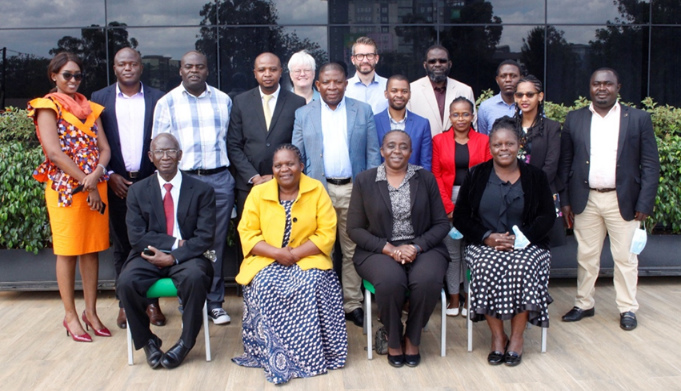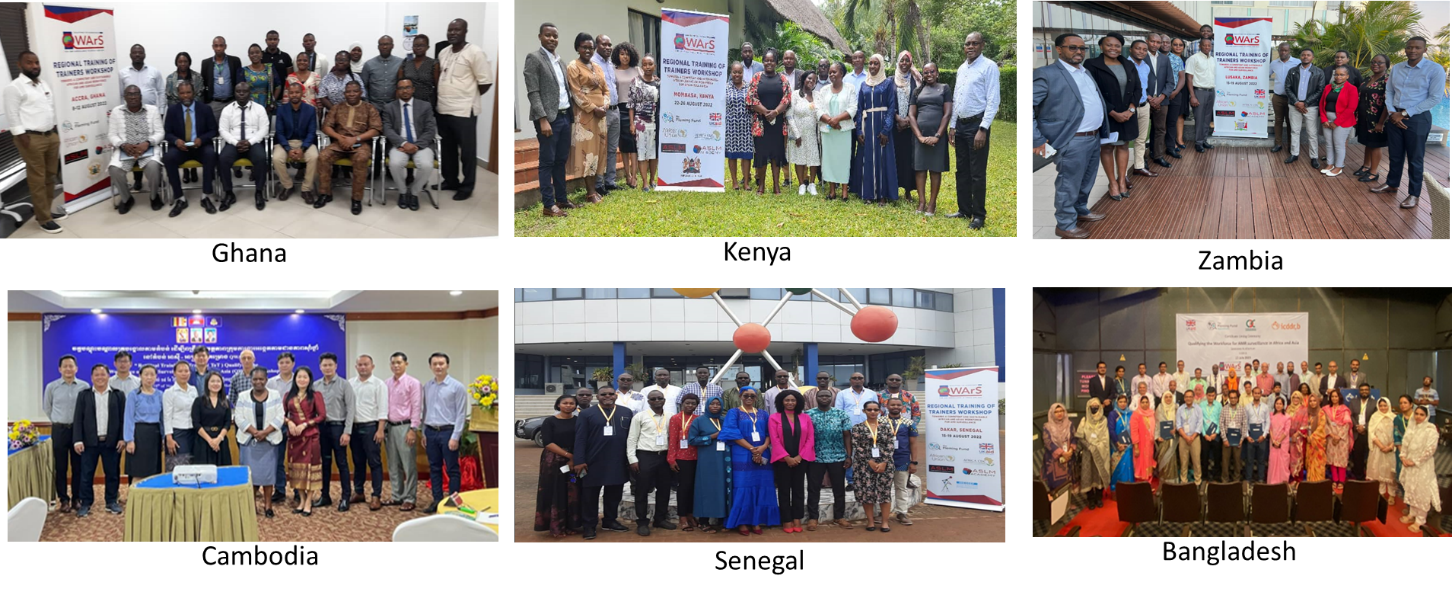Empowering Master Trainers to Strengthen AMR Surveillance Training Across Africa and Asia

Under the Fleming Fund Regional Grant, the African Society for Laboratory Medicine (ASLM) and partners are taking a significant stride toward enhancing antimicrobial resistance (AMR) surveillance training. As part of Phase I of the Qualifying the Workforce for AMR Surveillance (QWArS) project, a Master Trainer Training Track has been created to build the capacity of laboratory and epidemiology professionals to perform AMR surveillance functions. The primary goal is to bolster in-country training resources and the ability of a select group of QWArS participants – the Master Trainers – to effectively deliver training within their respective countries during Phase II.
The journey began with a Training-of-Trainer-of- Trainer (ToToT) Workshop held in Nairobi, Kenya, in June 2022, where 12 Subject Matter Experts supporting the delivery of the QWArS Training Program received specialised training to facilitate subsequent QWArS Regional Train-the-Trainer (ToT) Workshops. The Subject Matter Experts then participated in additional workshops in six countries to train the first cohort of Master Trainers between August 2022 and July 2023. These workshops included 45 participants from Fleming Fund priority African countries and 24 participants from Fleming

Fund priority Asian countries. During the workshops, the Master Trainers were trained across various sectors, including human health, animal health, food safety, and environmental health, all embodying a ‘One Health’ approach in the fight against AMR.
Workshop participants were quick to express their appreciation for the quality of the training they received.
‘I have been teaching for the past 15 years and attended many trainings, but until today, I hadn’t fully appreciated the difference between teaching and training,’ said Dr Shaqil Shams, a QWArS participant from Bangladesh.
Dr Beatrice Achan, a QWArS participant from Uganda, praised the program, noting, ‘The teaching materials were outstanding, with well selected examples of pragmatic pedagogical scenarios that made learning intuitive and easily applicable’.
The successful completion of these workshops resulted in the establishment of a competent pool of 69 QWArS Master Trainers across 14 African and three Asian countries. These highly skilled Master Trainers are now equipped to support the rollout of QWArS Training in their respective countries during Phase II. Their work will contribute significantly to AMR surveillance efforts across Africa and Asia. ASLM applauds the efforts of all involved and looks forward to supporting the Master Trainers during Phase II.
………………
About QWArS
The Qualifying the Workforce for AMR Surveillance in Africa and Asia (QWArS) project aims to address AMR’s challenge by building AMR surveillance capacity among laboratory and epidemiology professionals from the human, animal, food and environmental health sectors. As part of this process, QWArS aims to establish competency standards fit for the context of African and Asian settings, providing the knowledge and skill baseline for AMR surveillance training programs to work with. QWArS is being implemented in 14 African and 3 Asian countries and is led by the African Society for Laboratory Medicine and its partners: the Africa Center for Disease Control; the American Society for Microbiology; the Institut Pasteur International Network; the Institut de Recherche en Santé, de Surveillance Epidémiologique et de Formation; Foundation Mérieux; International Centre for Diarrhoeal Disease Research, Bangladesh; and the National Food Institute, Technical University of Denmark. Technical support partners include the Caviart Group, CLSI, DATOS, Infectious Diseases Institute Uganda, and One Health Trust.
About the African Society for Laboratory Medicine (ASLM)
ASLM is an independent, international, not-for-profit organisation founded in March 2011 in Addis Ababa that coordinates, galvanises and mobilises relevant stakeholders at the local, national, and international levels to improve local access to world-class diagnostic services and ensure healthy African communities now and for the long-term. ASLM is the first pan-African society for laboratory professionals, endorsed by the African Union (AU) and supported by multiple African Ministers of Health through its Ministerial Call for Action.
About the Fleming Fund
The Department of Health and Social Care (DHSC)’s Fleming Fund is a UK aid programme supporting up to 25 countries across Africa and Asia to tackle antimicrobial resistance (AMR), a leading contributor to deaths from infectious diseases worldwide. The Fleming Fund invests in strengthening AMR surveillance systems through a portfolio of country grants, regional grants and fellowships managed by Mott MacDonald, and global projects managed by DHSC.
